Thailand, a Southeast Asian country known for its stunning beaches, vibrant culture, and delicious food, offers a diverse range of tourist attractions. Here are some of the most popular cities and regions:
Bangkok
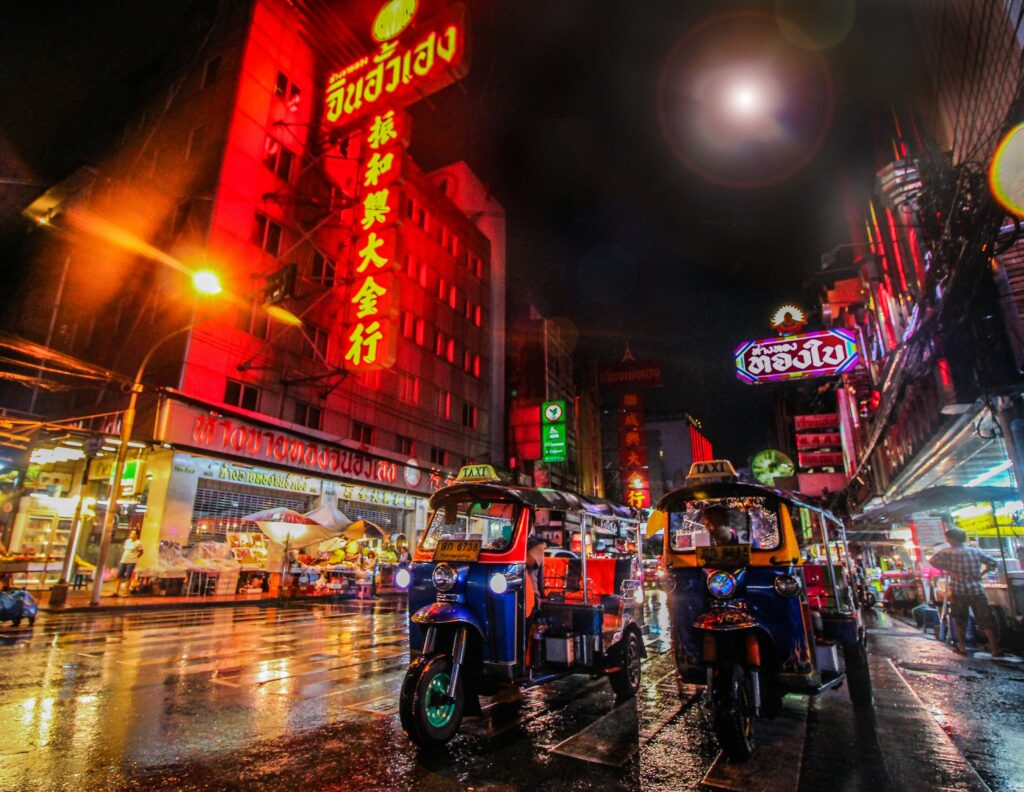
- Grand Palace: A complex of buildings that served as the official residence of the King of Thailand until 1925.
- Wat Pho: A temple complex known for its reclining Buddha statue and traditional Thai massage schools.
- Wat Arun: A temple with a towering stupa covered in colorful tiles.
- Chatuchak Weekend Market: One of the largest markets in the world, offering a wide variety of goods.
- Lumpini Park: A public park with jogging paths, lakes, and bird watching.
Chiang Mai
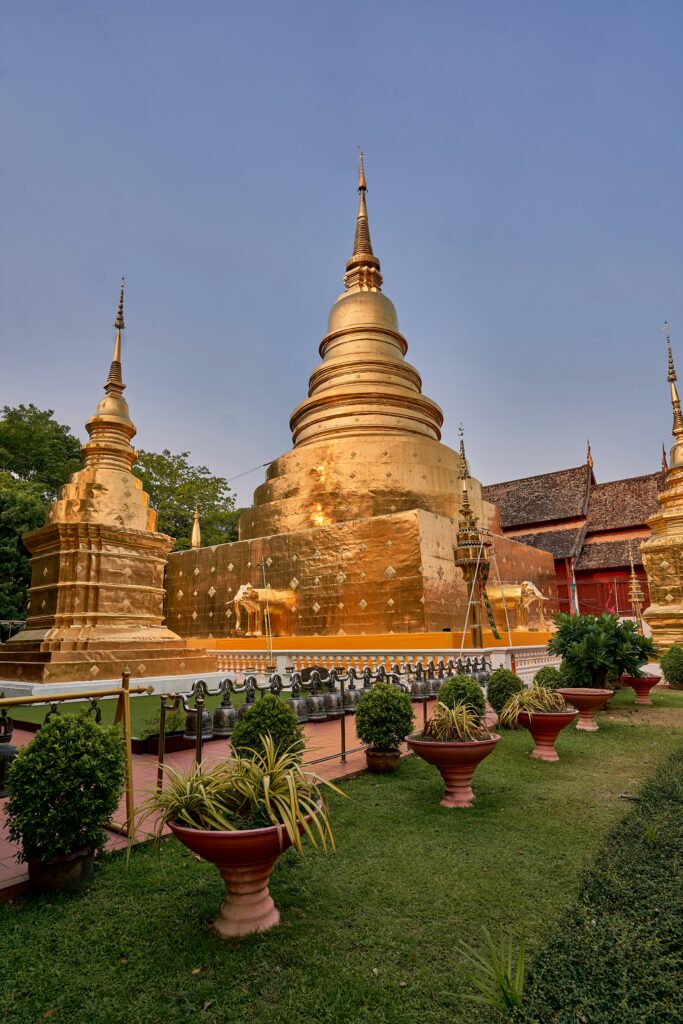
- Old City: A walled city with temples, markets, and traditional houses.
- Wat Phra Singh: A beautiful temple with intricate carvings and a chedi.
- Wat Chedi Luang: A ruined temple with a large chedi.
- Night Bazaar: A popular night market with food stalls, souvenirs, and entertainment.
- Doi Suthep: A mountain with a famous temple, Wat Phra That Doi Suthep.
Phuket
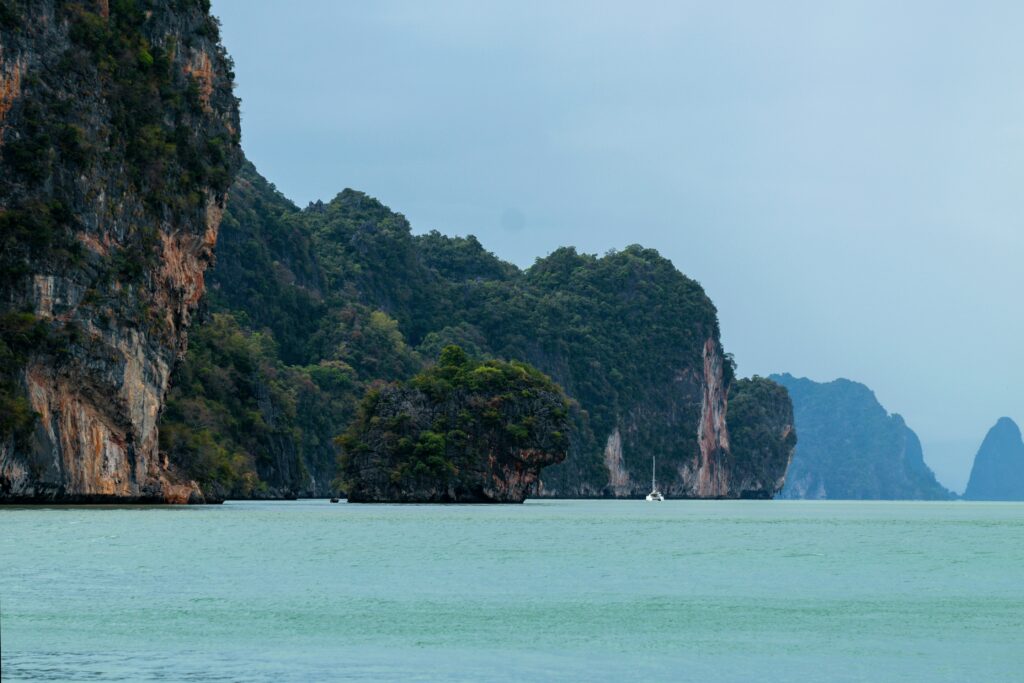
- Patong Beach: The most popular beach on Phuket Island, with lively nightlife and water sports.
- Kata Beach: A quieter beach with beautiful scenery and fewer crowds.
- Phang Nga Bay: A stunning bay with limestone cliffs and islands.
- Wat Chalong: A popular temple with a large chedi and beautiful gardens.
Chiang Rai
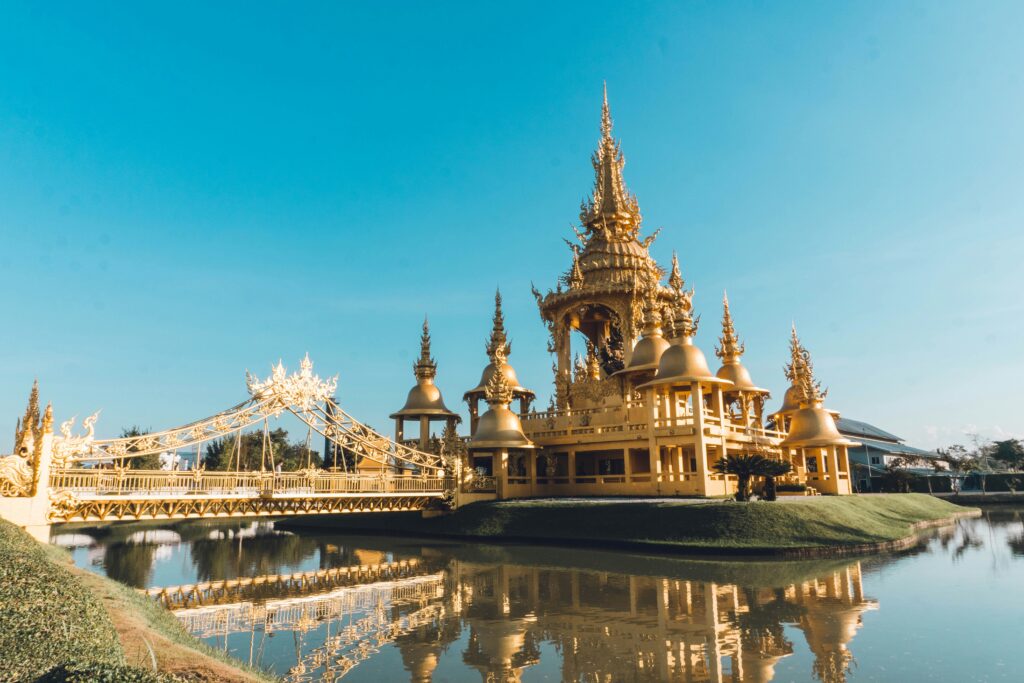
- White Temple: A unique temple with a white exterior and intricate carvings.
- Black House: A museum featuring art and artifacts from the Akha tribe.
- Golden Triangle: The area where the borders of Thailand, Laos, and Myanmar meet.
- Mae Sai: A border town with a lively market and a view of Myanmar.
Krabi
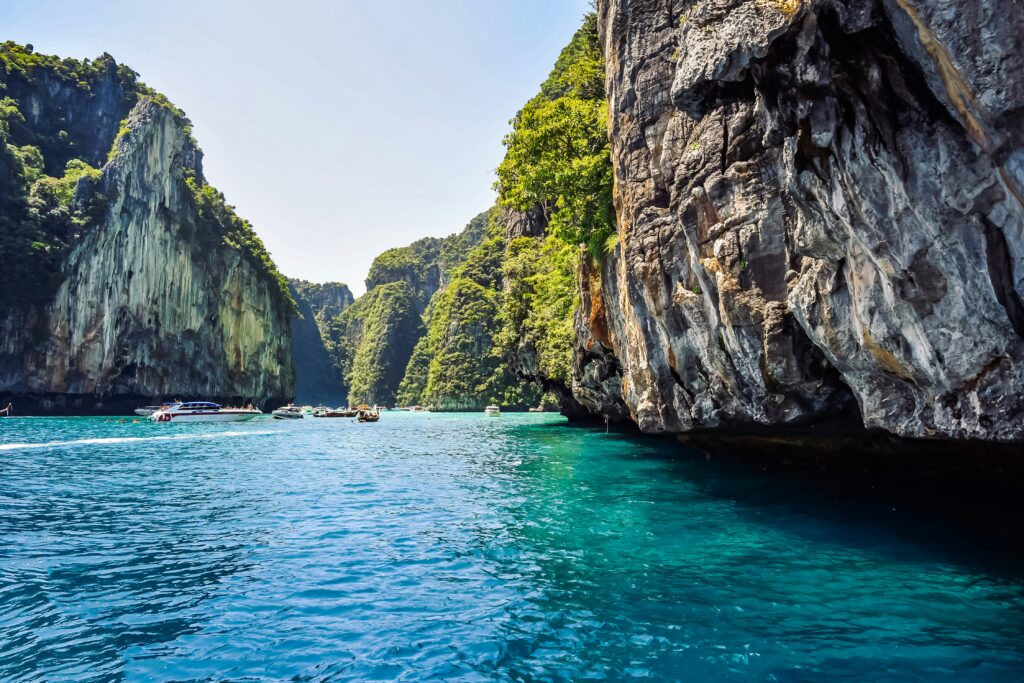
- Railay Beach: A beautiful beach accessible only by boat, with climbing and kayaking opportunities.
- Phi Phi Islands: A group of islands with stunning beaches, snorkeling, and diving.
- Emerald Pool: A natural pool surrounded by limestone cliffs.
These are just a few of the many tourist attractions that Thailand has to offer. With its friendly people, delicious food, and stunning scenery, Thailand is a popular destination for travelers from all over the world.
For a trip to Thailand, careful planning will help you make the most of this culturally rich, beautiful, and exciting destination. Here’s an expanded guide to ensure you have a smooth and enjoyable experience while traveling through Thailand:
1. Travel Documents
- Visa: Many nationalities, including those from the US, UK, EU, and Australia, can enter Thailand without a visa for tourism purposes for stays of up to 30 days if arriving by air or 15 days if arriving by land. You can also apply for a visa extension while in the country or request a tourist visa if you plan to stay longer.
- Passport: Your passport must be valid for at least six months beyond your date of entry and have at least one blank page for entry stamps.
- Travel Insurance: Travel insurance is highly recommended, especially for medical emergencies, trip cancellations, and theft. Thailand has good private hospitals, but costs can be high if you need treatment without insurance.
2. Entry Requirements
- COVID-19: Most COVID-19 restrictions have been lifted in Thailand, but it’s best to confirm any updated requirements before your trip, such as proof of vaccination or recent test results. Entry rules may vary depending on where you’re traveling from.
- Customs Regulations: Thailand has strict rules on certain items. You’re allowed to bring personal medications, but some prescription drugs that are legal in your country may be banned in Thailand. Always carry medications in original packaging along with a prescription.
3. Health Conditions
- Vaccinations: While no vaccines are mandatory for entering Thailand, it’s advisable to have routine vaccines up-to-date, including hepatitis A, hepatitis B, typhoid, and tetanus. If you’re visiting rural areas, consider vaccines for Japanese encephalitis.
- Malaria and Dengue: Malaria is generally not a concern in major cities or tourist areas, but it may be present in more remote regions near the borders. Dengue fever, spread by mosquitoes, can be an issue, especially in the rainy season. Use insect repellent and wear long sleeves and pants to protect yourself.
- Water Safety: Tap water is not safe to drink in Thailand, so stick to bottled water, which is widely available. Avoid ice in drinks from street vendors unless you’re sure it’s made from purified water.
4. Currency and Payment Methods
- Local Currency: The currency in Thailand is the Thai Baht (THB). ATMs are readily available in most urban and tourist areas, but some charge high fees for foreign cards. It’s advisable to carry some cash, especially when visiting rural areas or local markets, as not all places accept credit cards.
- Credit Cards: Credit and debit cards (Visa and Mastercard) are widely accepted in most hotels, restaurants, and larger shops in cities like Bangkok, Chiang Mai, and Phuket. However, small businesses, street food vendors, and taxis often only accept cash.
- E-Wallets: Digital payment options, such as QR codes and mobile wallets, are increasingly popular in urban areas and with younger vendors.
5. Language and Culture
- Local Language: Thai is the official language, and while English is commonly spoken in tourist areas, major cities, and hotels, communication in rural areas can be more challenging. Learning a few basic Thai phrases (such as “hello,” “thank you,” and “excuse me”) is greatly appreciated by locals and can help enhance your experience.
- Culture and Customs: Thailand is a predominantly Buddhist country, and respect for religious and cultural customs is important. Always dress modestly when visiting temples—covering your shoulders and knees is a must. Avoid pointing your feet at people or religious objects, as this is considered disrespectful. Remove your shoes when entering temples and people’s homes.
6. Safety
- Crime: Thailand is generally a safe country, but petty crimes like pickpocketing and scams targeting tourists can occur, especially in crowded areas and at popular attractions. Always keep your belongings secure, avoid poorly lit areas at night, and be cautious when approached by strangers offering unsolicited services or products.
- Scams: Be aware of common scams, particularly around tourist hotspots. These include taxi drivers who refuse to use the meter, tuk-tuk drivers offering “discount” tours that lead to overpriced shops, and people telling you that a tourist site is “closed” to steer you towards a friend’s business.
- Wildlife Safety: If visiting beaches or national parks, be cautious of wild animals like monkeys, which can be aggressive. Avoid feeding or touching them.
7. Weather and Clothing
- Seasons: Thailand has three main seasons:
- Cool Season (November to February): This is the most pleasant time to visit, with cooler temperatures and minimal rain, especially in the north.
- Hot Season (March to May): Temperatures can soar above 40°C (104°F), making outdoor activities uncomfortable. Stay hydrated and wear lightweight, breathable clothing.
- Rainy Season (June to October): Expect heavy rainfall, especially in the afternoons. While this season can have fewer tourists, it may disrupt travel plans. Pack an umbrella and rain gear if visiting during this time.
- Clothing: Pack light, breathable clothing due to Thailand’s tropical climate. Modest clothing is recommended for visiting temples and rural areas. Comfortable shoes are essential for exploring cities, temples, and nature.
8. Transportation
- Public Transport: Thailand has a range of transport options. In cities like Bangkok, you can use the BTS Skytrain, MRT Subway, and public buses to get around. Tuk-tuks and motorbike taxis are common, but always negotiate fares beforehand. In more rural areas, buses and songthaews (shared taxis) are available.
- Taxis and Ride-hailing: Taxis are widely available in cities, but insist that the driver uses the meter. Ride-hailing apps like Grab are popular and reliable, offering safer, more predictable fares.
- Trains and Buses: Thailand’s rail network is a great option for traveling between major cities, with scenic overnight trains to destinations like Chiang Mai and Surat Thani. Buses are also affordable for long-distance travel but can be slow.
- Driving: Renting a car or motorbike is an option for more adventurous travelers, but traffic in Thailand can be chaotic. Always carry an International Driving Permit (IDP), and be mindful of traffic laws. Avoid riding motorbikes without proper experience, as accidents are common.
9. Accommodation
- Hotels and Resorts: Thailand offers a wide range of accommodations, from budget hostels to luxury resorts. Cities like Bangkok, Chiang Mai, and Phuket have numerous international hotel chains as well as unique boutique options. Always book in advance during high seasons (November to March).
- Guesthouses and Hostels: For budget travelers, guesthouses and hostels provide affordable and comfortable lodging. These are particularly common in backpacker hotspots like Chiang Mai, Pai, and the islands.
- Beach Resorts and Bungalows: Thailand’s islands and coastal towns offer beautiful beach resorts and bungalows. Koh Samui, Phuket, and Krabi are popular choices, offering everything from budget stays to high-end luxury resorts.
10. Emergency Numbers
- Embassies: Ensure you have the contact details for your country’s embassy or consulate in Thailand. Most are located in Bangkok.
- Emergency Numbers:
- Tourist Police: 1155 (English-speaking support)
- General Police: 191
- Ambulance and Fire: 1669
11. Internet and Telephony
- Local SIM Card: Prepaid SIM cards are affordable and easy to obtain at the airport or major convenience stores. AIS, DTAC, and TrueMove are the main service providers, offering reliable 4G coverage across most of the country. Having a local SIM card with data makes navigation and communication much easier.
- Wi-Fi: Free Wi-Fi is available in many hotels, cafes, and restaurants, especially in cities and tourist areas. However, having mobile data is useful for more remote areas.
- Electrical Adapters: Thailand uses 220V and two-pronged plugs (types A, B, and C), so bring a universal travel adapter if your devices use a different type of plug.
12. Working Hours and Public Holidays
- Business Hours: Most shops, restaurants, and offices in Thailand operate from 9 a.m. to 6 p.m., with shopping malls staying open until 10 p.m. Markets and street food vendors can operate well into the night, especially in tourist areas.
- Public Holidays: Be aware of major Thai public holidays, like Songkran (Thai New Year) in April, which involves water celebrations and can cause some businesses to close temporarily. Loy Krathong (Festival of Lights) in November is another significant festival, where people release floating lanterns into the water.
13. Tipping
- Tipping is not expected in Thailand but is appreciated, especially in tourist areas. In restaurants, you can round up the bill or leave a small tip (about 10%). For porters, drivers, and tour guides, small tips are customary for good service. However, don’t feel obligated to tip at street food stalls or small local eateries.
14. Cultural and Social Connections
- Thailand is known for its friendly locals and its reputation as the “Land of Smiles.” You’ll find opportunities to immerse yourself in local culture, from cooking classes and Thai massage lessons to visiting rural villages and attending traditional festivals. Always be respectful of the local customs, and engage with locals in a polite, friendly manner.
15. Healthcare and Emergencies
- Pharmacies: Pharmacies (drugstores) are common and offer a wide range of medications, many available without a prescription. However, pharmacists may not always speak English, so knowing the generic names of medications is helpful.
- Private Hospitals: Thailand has excellent private hospitals, particularly in cities like Bangkok, Phuket, and Chiang Mai. Many offer world-class care at affordable prices, making Thailand a destination for medical tourism. However, costs can add up quickly, so ensure your travel insurance covers medical expenses.
Final Tip: Thailand offers an amazing mix of bustling cities, stunning beaches, rich cultural heritage, and delicious food. By being prepared and mindful of local customs and conditions, you’ll have a memorable experience in this beautiful Southeast Asian country.

